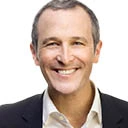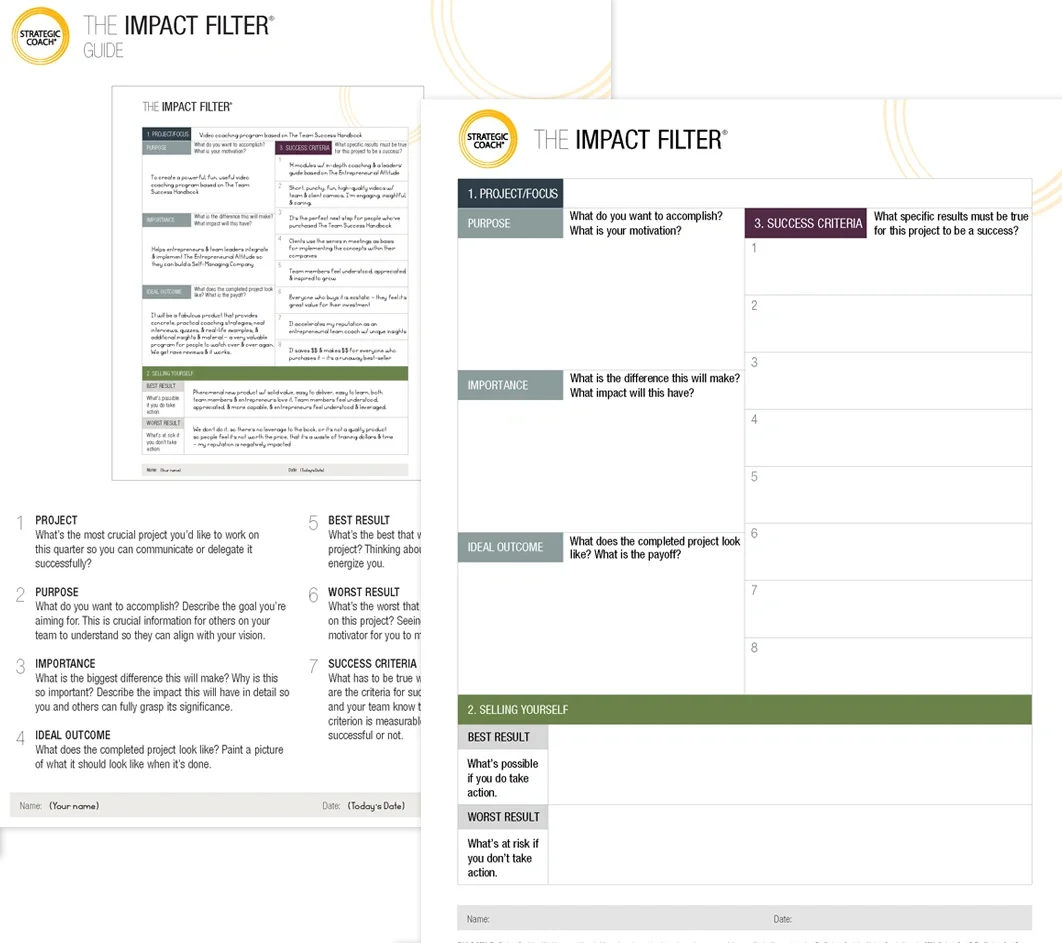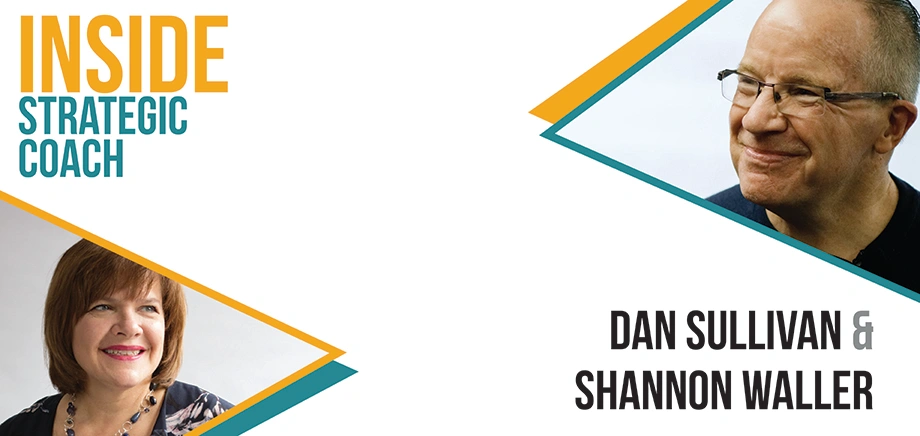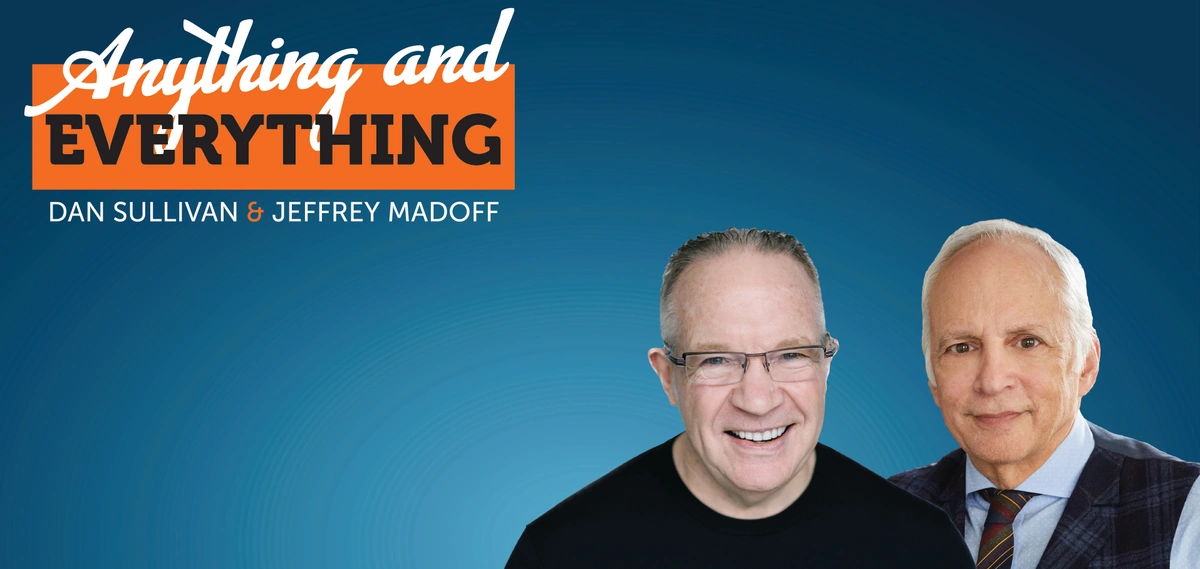Why Playing With Time Drives Growth
November 04, 2025
Hosted By
 Dan Sullivan
Dan Sullivan
 Steve Krein
Steve Krein
In the second half of their discussion on ambition, Dan Sullivan and Steve Krein explore how ambition can remain fresh and exciting at every stage of the entrepreneurial journey. They reveal why measuring progress correctly, creatively managing your time, and building personalized systems help you stay motivated, resilient, and focused on a bigger future.
Show Notes:
Ambition means always having a future that feels bigger and more exciting than your past.
The urge to see how far you can really go unlocks an endless cycle of growth and new achievements.
Progress is best measured by looking back at how far you’ve come, not by comparing against some distant, moving target.
Focusing only on what’s next makes it hard to appreciate the real gains you’ve already made.
Most Strategic Coach® tools are created to solve the feeling of being stuck or falling short.
Celebrating even small wins keeps momentum strong, and progress doesn’t have to take forever.
Structuring your time around a handful of priorities, like five tasks over three days, offers creative flexibility and less pressure.
Every thriving entrepreneur has built their own time system that fits how they work best.
Working nonstop isn’t a badge of honor; you’re better off building in time for rest and recovery.
Resources:
The Gap And The Gain by Dan Sullivan with Dr. Benjamin Hardy
Time Management Strategies For Entrepreneurs (Effective Strategies Only)
Primal Intelligence by Angus Fletcher
Always More Ambitious by Dan Sullivan
Episode Transcript
Dan Sullivan: Hi everybody, it's Dan Sullivan, and I'm here for Free Zone Frontier with my chatting exploratory partner, Steve Krein. And Steve, we had a really, really interesting exploration of the ambition as it relates to entrepreneurs in our first session, and now we're ready to go again.
Steven Krein: Excellent. Looking forward to our conversation, Dan.
Dan Sullivan: I think the big thing is that you just always have a future that's bigger than your past.
Steven Krein: Yeah. The ultimate definition of ambition.
Dan Sullivan: Yeah. Yeah, I think that's it. You know, and mine comes from a particular incident that I had when I was, as near as I can figure, I was 11 years old. You know, people talk about like a religious experience, spiritual experience or something. The closest I can come to understand this is I was on the farm, this is boyhood Ohio, childhood, growing up on a farm. I know it was February, it was a particular quality of—the weather when you're out there, you're very crisp and all the fields, there's nothing there and there's this really neat snow on the ground.
I was walking across, probably five o'clock in the afternoon, and a plane was coming across. It was either coming from New York or it was coming from Cleveland, flying west, probably to Chicago. Big plane, you know, DC-6. The reason I'm saying 11 years old, it was a propeller plane and the jets came in after that, so it wouldn't have been a jet. And I was just watching it, and all of a sudden I just got this sort of bang, and a question came into my mind: I wonder how far I can go? And my whole life since then has been about, I wonder how far I can go, and I've gotten this far, so when I take a jump, I take the jump, I enjoy the jump, and I say, now I wonder how far I can go, and then it's the next jump.
Steven Krein: If you were to tie that to the Gap, and maybe this is the bookend of the podcast episode around ambition, how do you measure progress with ambition? You know, there's The Gap and the Gain framing of making sure that you're measuring yourself by the progress you've made, not by not achieving or getting to the horizon. How do you think about that? Does it fit perfectly in? Does it change your thinking about it? Where do you see ambition and the Gap and the Gain concept playing together?
Dan Sullivan: I'll start with the Gap. I think the Gap was a problem I was experiencing, where I would make progress, but it wasn't enough progress. So I felt, and I said, I'm thinking wrongly about this. I mean, that's where a lot of the tools come from, is that I'm experiencing a tension in the forward movement. There's sort of a tension, or I'm being held back, or there's just an angsty feeling. And I said, let's think about this differently. And I said, the problem is I'm measuring forward and I have to measure backwards.
So you make progress, measure where you started and everything's cool. You measure forward and doesn't matter how much the progress is, it's not cool. And so I said, you got to think about it differently. And the moment I introduced the Gap and the Gain, it just solved lots of problems for our clients.
Steven Krein: Now, integrate that into ambition here from always being ambitious, always more ambitious.
Dan Sullivan: Yeah, I think not being there is a Gap concept. I'm here, but I'm not there. And you're being obsessed by the there and the there is not allowing you to enjoy your progress. Okay. One of the things that I've really noticed, I've come up with a really neat little time system in the book that I sent you, the PDF version of it. I can just give you the download for getting the full book because I know you like listening. Yeah, so I'll give that to you right at the end of the podcast.
But what I wanted to do was to solve the problem that you have to take an enormous leap and jump and have an enormous achievement in order to get a sense of real progress. And I said, why don't we just make it that all progress is satisfying and the thing you do today is progress and it makes you feel good, rather than it's something that's three months long or it's a year long and you have to go through an entire year before you're going to get a feeling that you're really making progress. You've got to shorten the time frame.
And I'm working on it. It's been about two months long now. And I use a Fast Filter to do this. So I do best result, worst result. And then I do five achievements that will be completed over the next three days. And then I get a fourth day that's a Buffer Day. I can do anything I want on the fourth day. But what I do is I review what I did over the three days. So looking backwards, okay, I achieved five things. I said I was going to achieve five things. I achieved five things. But three days gives you a lot more flexibility for getting five things done. You might get three done on one day. You might get two.
And then I say, okay, now I got to set up the next three days. So on that fourth day, you have to review your progress, and you have to look at the next three days, and then do it at five. And I've done it. I'm on my 15th right now, 15th.
Steven Krein: Your 15th cycle with this?
Dan Sullivan: 15th cycle. And it just feels really, really good. I'm not angsty about what lies beyond the three days going forward, and I'm not feeling dissatisfied with what happened before the last three days. So I kind of brought the there and the here together.
Steven Krein: Yeah. How do you compare that to what you would typically do with what are the three things you want to get done tomorrow or today? How do you think about that differently?
Dan Sullivan: Yeah, I think the big thing is that It's too tight a framework.
Steven Krein: One day?
Dan Sullivan: Yeah, one day is too tight. But here I'm giving myself a three-day framework, and it's five things. So instead of nine things. But the other thing is that I get bored with three things every day. I just get bored with it. But five things over three days gives you a lot of flexibility. Yeah. Do you have a time system that you don't talk about? A time system that really makes sense for you. Do you have a time system?
Steven Krein: Yeah. Well, let's start with the Free Day, Focus Day, Buffer Day time system has kind of gone into the background of just like, I don't work weekends. They're Free Days. They've been Free Days for 25 years, maybe 28 years. So much so that when my kids got to college, they didn't realize that every family doesn't do that.
Dan Sullivan: Like it was one of those things like they discovered a lot of things when they got to college.
Steven Krein: Yeah. But it was this funny thing about like, people run errands on weekends and people's parents work on weekends.
Dan Sullivan: It's like, again, one of those things that, you know, like you said, you don't realize until you mean every family doesn't do a Positive Focus at dinnertime.
Steven Krein: Exactly. Exactly. That's very funny. What I found, though, is that in the world we're living in today, more and more, it's difficult to think of Focus Days and Buffer Days, though, as full days of that. Because what I'm finding is that there's, in some ways, and I found this very helpful to think about my morning as a day, and my afternoon is a day, and my evening is a day. So almost like three days in one day. And so I've tried to think about, for me, mornings are my focus time. And I rarely, rarely will have anything in a morning before 10 o'clock, and even anything I do from 10 to 12 is focus time, Unique Ability time. I've kind of adapted it to be part of the day.
And the example of the evening part, you know, let's call it maybe six or seven o'clock on is I think of it like free time and I'm not doing work or doing things in there. So that's kind of one aspect of it. But I found time blocking in particular for me because I have ADD like most entrepreneurs. And I found that if I don't put a task in my calendar, and I do organize it, by the way, by Focus or Duffer kind of activities, if I don't block the time, it can't just be like three things on a list.
So I will put that one hour or two hour chunk as that activity. So that's kind of a big part of what I've done. But I don't look at three days together. I think it's an interesting framing. I am definitely looking at a week and then each day of the week. And I think of Monday to Friday as the week.
Dan Sullivan: Yeah, well, it's just an experiment, so I'm in the early stages of it, you know. But I'm convinced more and more that if you had real people putting the cards on the table with any entrepreneur, then they're successful, you know, they're moving forward. That they've created a kind of unique time system for themselves.
Steven Krein: Absolutely. And if you go into the details of what's in those hours, you know, you can look and say just every morning there's exercise. There's nothing to talk about. It's just not a decision. Yeah, and the only time you realize it's off is if something happens and it disrupts it for something like you're traveling or there's something happening. So, but it's interesting, you know, I wonder, do people ever stick with one forever? Or like you said, you get bored.
Dan Sullivan: Well, I haven't. I think that more and more as I look back with the Free, Focus, and Buffer Day, because it's 33, 34 years old since we came up. I think it was ‘91 that we came up, so it's 34 years. It's secure workaholism. They were holding themselves accountable for 365 Focus Days a year.
Steven Krein: You stretched my mind 28 years ago, I guess it was ‘98, when I was only 28 and I learned the concept of a Free Day. And so for workaholics, or people who work and think they have seven days a week to let their work flow through, that's a game-changing, life-changing concept that, I think I probably said this to you then, or Babs, because she was my first coach, it was permission. And it was permission that it's okay, and you're not rewarded for working seven days.
In fact, you should reward yourself not by the end of the week being the weekend, but it's start every week with two days off and you're able to really rejuvenate during that time. And so of all the things you could pick, you know, different aspects of the time systems, but I think that's one that is timeless in that even in 2025, the concept of really taking weekends off for especially for entrepreneurs, well, especially entrepreneurs with families.
Dan Sullivan: Yeah. Yeah. So it's an interesting question. Yeah. It's like scaffolding, you know, you create scaffolding so you can build a really great building. But when the building is finished, take the scaffolding off. Yeah. A lot of people are still living in the scaffolding. They've never gotten into the building, you know.
Steven Krein: Yeah.
Dan Sullivan: But more and more, I feel that the entrepreneurism, why I'm so interested in it, that entrepreneurs, I think, are more ingenious with time than the normal population, than the non-entrepreneurial. I just think that entrepreneurs play with time more than anything. And I find creativity is very much geared to how you play with time.
Steven Krein: Yeah, sometimes it's an activity in and of itself, to think about your plan, your tasks, your priorities. It can be a procrastination mechanism, but more times than not, it's actually thinking time that you're playing with the blocks, if you will, but they're just time and tasks. It is therapeutic sometimes to reorganize your time and shake it up.
Dan Sullivan: The big thing, and this has been an interesting year for you, because the entire ocean on which you were sailing, you know, and the geopolitical structure of the world changed really drastically. And we've had a number of changes. COVID was a bit of a change like that. But just think of where you are today and where you were three months ago.
Steven Krein: Yeah, and it kind of does circle back to ambition. I think that when things outside of your control, you talk about COVID or you talk about what you're referencing now, is that the significant changes with the new administration as it relates to funding health innovation and the regulatory agencies and all the things that were thrown into uncertainty back in early 2025 rattled entrepreneurs and innovators and scientists. I mean, it rattled lots of people, but for my community and where we live with thought leaders, decision makers, entrepreneurs, funders, and everybody supporting health innovation.
Whatever you say about the health industry, it was pretty predictable of what was gonna happen, how long things were gonna take it if they took a long time. What happened earlier this year really was a tremendous amount of uncertainty about so much of the things around survival of companies or clinical trials or different things that were going on. And for me now looking back, I think for context setting, an important thing to go through and to almost reset and recommit to making sure, number one, you don't lose your ambition, and number two, that you can stay the course to make sure that your focus and your energy and the changing landscapes gets built into what you might have thought was going to be the plan for the year to a new plan.
And I think, especially for entrepreneurs who've been in this for decades, sometimes you end up getting reminded about things that you only knew when you started out, but you hadn't been intimately reminded of how it feels to be an entrepreneur with some of the certainty transforming or quickly becoming uncertain, and just how rattling that is for an entrepreneur who has worked so hard to get to a place where you didn't have to worry about some of that uncertainty.
Dan Sullivan: Yeah, I've just come across a book and an author that is the most original thinking that I've come across in the last 25 years, and I'm happy to promote it. It's called Primal Intelligence, and the author's name is Angus Fletcher. And he's a professor at Ohio State. He's got a special kind of experimental unit at Ohio State, the Ohio State University, as they like to call it. And I think it's because of AI that this book has been written. A lot of his fieldwork is, how do you make really good decisions when it's chaos all around and you have little information? You just perfectly described your situation.
It's a very short book. It's worth the read.
Steven Krein: I'm ordering it when we get off.
Dan Sullivan: Yeah. And he works with special operations soldiers like Navy SEALs and Delta. And they're expected. They live in chaotic conditions and they have to make correct decisions because their life depends upon it. The mission depends upon it. And he found out that they think very, very differently from normal people. But they sought him out. They actually came to get him out because he was putting structure and meaning and definitions to things that they had developed naturally. I just found it really interesting. And I think this is happening because of AI.
Steven Krein: What does he describe? What's the difference between primal intelligence, primal instinct? What is it a contrast to, primal intelligence?
Dan Sullivan: Yeah, he said that the way most intelligence is defined, certainly in the academic world and other parts of the world, is that it's logic. Logic is intelligence. And the more logical you are, the more intelligent you are. And he says, well, that works in certain situations, but he said, but not in chaotic situations. And what he found was that in other situations where you don't have a lot of information, a lot of things that you thought were going to happen aren't happening. He says there's another kind of intelligence and he says you have a story.
You have a story about yourself and you tell a story about your past and you've been telling yourself a story about your life so far and you have to change the story and as soon as you change the story you have clarity again of how to operate. And you were going through that when I talked to you. The reason I introduced The Triple Play is because The Triple Play is a totally different story. You're using known things, but you're putting them together in a completely different direction. You're creating a new story.
Steven Krein: It's interesting when you think about, like, in life and in business, everything's like an algorithm, right? You have these rules and these kind of processes that are in place, and you have assumptions about things. Even if over several years you build a stronger algorithm of different things and scenarios that can take place, and then once in a while something happens that just breaks the algorithm.
Dan Sullivan: Yeah. Trump. [laughs] No, no, I mean, but that's just an example. I mean, that it was very clear, you know, in 2016, that Hillary was going to be the next president. It was all set, you know, seven o'clock on election day, 90% in The New York Times. She's got a 90% chance, you know, but it's not AI. November 30th, 2022, and ChatGTP gets released. And all of a sudden it's a total game change. Yeah, the tariffs, putting the tariffs on the world, you know, and everything like that. So we're in a situation now where algorithmic thinking isn't going to handle everything. You got to have a different way of thinking. Yeah.
Steven Krein: You said something when we talked about. The Scary Times Manual, which addressed some of this, which is 9-11. Yeah, 9-11. I think you brought it back out in 2008. You brought it back out in 2020. One of the things that I always admired is a statement you made about, not that you were prepared, but in many ways, how long it took you to get prepared has gotten shorter and shorter. In other words, it rattles you. But by the time you, you know, landed, as an example, I think you talk about in the audio book for Scary Times, you talk about, you know, you got on the plane, you didn't know what you were going to do.
But by the time you got off the plane, you had a plan. Before that, it might have been a day or two or a week or two. And I think when you and I spoke back in April, for me, it was a very unsettling, uncertain time. And I would say that the, you know, what's called a couple of months as things were shaking out and not getting much clarity on until, you know, we did a few months later, it's incredibly unsettling. But the algorithm change.
Dan Sullivan: Well, I think the biggest thing, you acquired a new capability, you know, the first time it happens, it's all scary. And you have enough of a survival instinct as an entrepreneur that it doesn't matter. There's nothing else you can do in your life. So you might as well just find a new way of being an entrepreneur. I mean, you're not going to get a job, you know, forever unemployable. But that's actually a great certainty that there's no alternative except coming to grips with what you're dealing with in a new way.
Steven Krein: Yeah, well, I think if you kind of come back to tie this together with how long you've been an entrepreneur, what's it going?
Dan Sullivan: 51.
Steven Krein: Beyond 50 years. Number one, how many people can say they've been an entrepreneur for that long? I think you hear about how much of Warren Buffett's wealth was created after 60 or 65. I think there's some crazy stats and data on that. There's something really provocative, Dan, and powerful about you at 81 writing a book about ambition and always more ambitious. And I think it's not just marketing speak, and it's not just timely for entrepreneurs everywhere, it's where it's coming from.
And the fact that you can say that after 50 years of being an entrepreneur and coaching entrepreneurs, that it's the single most important word that you found that kind of encapsulates what you said in that conversation you had at your conference. What's ambition going to look like for you at 90 versus 80? And your answer was, I have more of it. You're more ambitious at 90 than you were at 80.
Dan Sullivan: Yeah. And I think the big thing is that there's a whole podcast, so I'm not going to go into it, but the most fundamental book that I ever read in my life, you know, I talked about this recent book and it's not as equal to the greatest book I ever read. It was Euclid, and Euclid was the Greek who lived in Alexandria, so he lived in what's now Egypt. He created the whole foundation for mathematics in a book that had 47 propositions, and I memorized all of them. I used to be able to go do a blackboard and do all 47 propositions.
But it was a way of creating a new form of knowledge. And if you do an AI search and say, who are the most fundamental thinkers in the world, that their work is more present in the world today than it was 1,000 years ago, it's Euclid, because he figured out that nature respects no angle except a 90 degree right angle. That if you build something and it's not 90 degrees, nature will tear it down, gravity will tear it down. And that the entire physical structure of our constructed world depends on this book that was written in 300 BC. I'm very foundational, but his was angles and you know, how lines put together and circles are great and everything.
Mine is, what is it that makes entrepreneurs tick? And I've been working on this for 51 years. What makes entrepreneurs tick? What is it that makes them do something that is not safe? It's not predictable. It's not understandable by people who are not entrepreneurs, but just what makes the things tick so they can feel great about it. I just want to tell you why being an entrepreneur is such an enjoyable activity for you.
Steven Krein: I love it. I love it. Dan, what's been your biggest insight from this conversation today?
Dan Sullivan: Well, your questions were just superb because you're getting me further into being able to present this because I think this is the rest of my life. I think this topic that I'm doing now is the rest of my life. I'm just gonna go deeper. There's gonna be more tools on this and everything, but I just want to reward entrepreneurs for all the risks that they've taken, you know, and all the kinds of things that you went through earlier this year, that you'll look back a year from now and say, thank God I went through that. Yeah. I think you're already feeling that.
Steven Krein: Yeah, by the way, I am, and I'm grateful for you for many of our conversations during that period of time. It was not that I didn't have the tools. I didn't remember some of the tools. I didn't think some of the tools were relevant, but you gave me kind of a framework to think about everything. And the great Kim White, by the way, is also an incredible resource for any entrepreneur or person where anything they're going through, where they face limiting beliefs or lack of clarity or so many other things that you need. But I kind of use the blessing and the curse of being ambitious, Dan, or always more ambitious, is when you lose it temporarily or you feel like you lost it temporarily, it's a very out of body experience because you just don't even recognize yourself when you put down your head at night or you look in the mirror or even you talk to people.
And so I think the work that you're doing with ambition is incredibly powerful, especially given that you're 81 and especially given that you're contextualizing it over 50 years. I think it's a reassuring topic to make people who struggle with what you described around, you know, what it means to be ambitious and knowing that you can do it decade after decade after decade is really powerful.
Dan Sullivan: This is a great conversation. And it gets better.
Steven Krein: And it gets better. Always enjoy our conversations, Dan. Thank you.
Dan Sullivan: Thank you.
Related Content
The Impact Filter®
Dan Sullivan’s #1 Thinking Tool
Are you tired of feeling overwhelmed by your goals? The Impact Filter is a powerful planning tool that can help you find clarity and focus. It’s a thinking process that filters out everything except the impact you want to have, and it’s the same tool that Dan Sullivan uses in every meeting.







